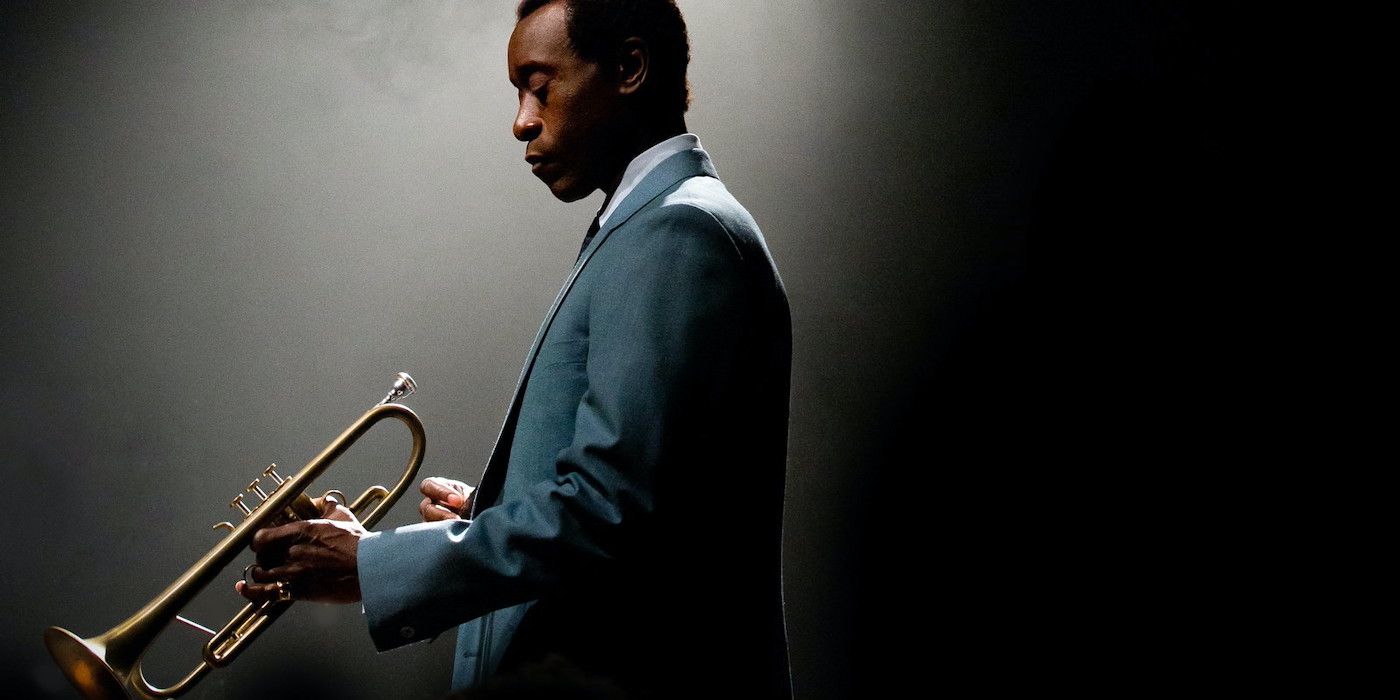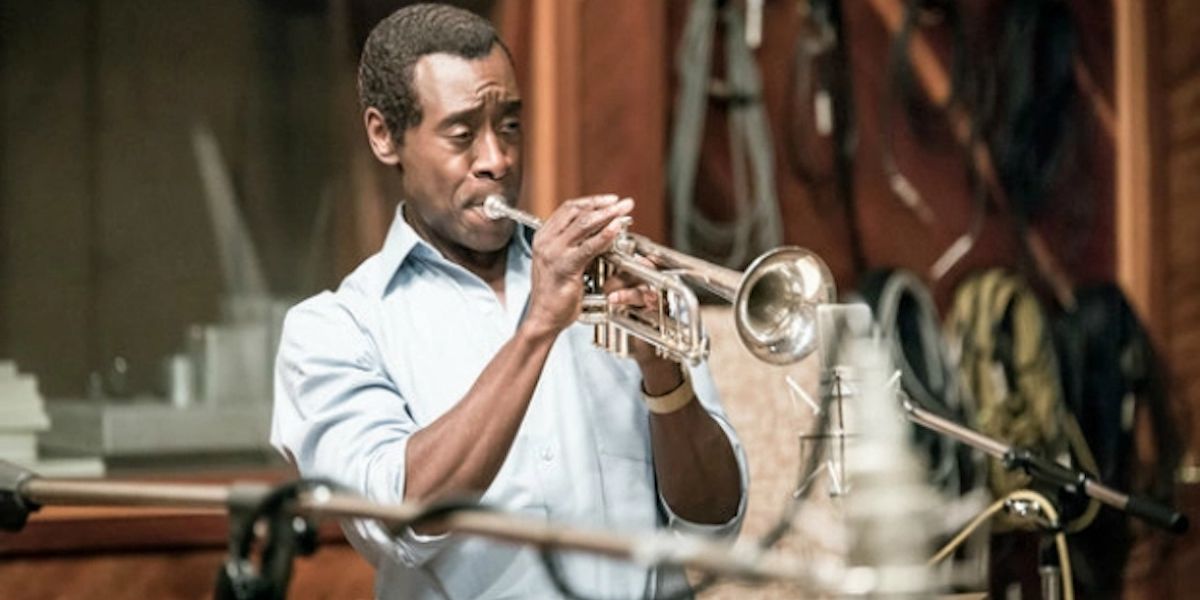The concept of telling an iconic musician’s life story through their music isn’t a new one, but it's steadily become one of Hollywood’s go-to blockbuster genres. In the wake of the massive box office and awards success of Straight Outta Compton and Bohemian Rhapsody, musician biopics are being greenlit left and right. In the next few years, we will be getting films centered around Madonna, the Bee Gees, Leonard Bernstein, George Clinton, Bob Marley, and even “Weird Al” Yankovic.
Miles Ahead, the feature film directorial debut of Don Cheadle, was seemingly a few years away from capitalizing on this trend. The “biographical” film spends a day in the life of Miles Davis, who gets into a series of misadventures with the music reporter Dave Braden (Ewan McGregor). Braden claims to be working on a piece about Davis’ “comeback.” Audiences didn’t quite latch on to Miles Ahead in the same way they did with films like Elvis and Rocketman. After modest reviews out of the New York Film Festival, the film skipped the awards conversation altogether, and ultimately landed a spring release date.
Perhaps, it’s not hard to see why Miles Ahead didn’t become a Bohemian Rhapsody-esque overnight sensation. Those who were looking to the film to learn more about Davis’ life may have left the theater confused, or disappointed. Although there are some critical flashbacks to early moments of inspiration for Davis, Miles Ahead doesn’t sum up his entire life. There isn’t one key moment that “summarizes” the essence of Davis’ work into a convenient truism. Instead, Cheadle chooses to show a fun, individual story about Davis having to deal with the consequences of his own legacy. It’s not as much of a “biopic” as it is a memory.
There’s a free-form nature to the way the story unfolds. This couldn’t have been a better way to approach the nature of jazz, as Davis’ daily routine was often as unpredictable as his musicianship. Cheadle begins the story at an unspecified date at the end of the 1970s. Davis has already made a name for himself, but he’s no longer the draw that he once was. Jazz is an art form that’s all about what’s “new and exciting.” At this point in his life, Davis isn’t either.
This was a great way for Cheadle to step into the role. Any musician biopic, particularly one that centers around someone who was under so much public scrutiny, risks turning the central performance into an impression. Cheadle shows that Davis is doing his best to not be impersonated; he dislikes those that would attempt to put him in boxes, summarize his achievements, or define his music as just one specific genre. This is essentially everything that Braden is trying to do. “Don't call it "jazz", man,” he says. “That's some made-up word. Trying to box somebody in. Don't call my music "jazz". It's social music.”
Davis isn’t interested in trying to explain the nuances between “jazz” and “social music” to a half-witted reporter like Braden, especially after he learns that Braden’s claims to be working for Rolling Stone are filled with half-truths. However, Braden becomes Davis’ unwitting partner as they search for a series of stolen tapes that contain Davis’ recent recordings and collaborations. Cheadle shows an obsessive quality within Davis. He’s so intent to manage his streak of independence that he doesn’t want anyone else to take ownership of his work. It’s partially about artistic integrity, and partially about ego.
This madcap detective story creates some wonderful comedic moments as Braden and Davis bicker. At one point, Braden locks Davis out of his own home just so he’ll hear him out. Braden serves as an appropriate audience avatar. At the beginning, he’s simply in awe of Davis, and is desperate to pry even the smallest insights from a man he considers to be so influential. However, as he actually gets to learn about Davis as a person, Braden finds that he can be temperamental, rude, and problematic. He gets a more well-rounded perspective on Davis’ life as he hears about his failed marriage to the dancer Frances Taylor (Emayatzy Corinealdi).
Cheadle uses the recordings contained on each tape to initiate flashbacks into the period of Davis’ life when he recorded them. Among these are the scenes with him and Taylor. Isolated from the rest of the story, these scenes might have constituted a more traditional biopic. Taylor falls in love with Davis, becomes his muse, and ultimately grows apart from him as he descends into addiction and self-obsession. It’s more interesting to see these moments in the way that Cheadle presents them as personal flashbacks. Davis is intent on moving forward with his music. Reminiscing on the past reminds him of how different he was as a younger man.
Cheadle’s fluid take on the chronology is in line with Davis’ personal ambivalence about his greatest hits. He picks and chooses moments from Davis’ most iconic tracks, including Kind of Blue (1959), Someday My Prince Will Come (1961), Bitches Brew (1970), Agharta (1975), and We Want Miles (1981), but they aren't presented in chronological order. Ironically, the actual recording sessions are the least interesting part of the film; they’re not nearly as exciting as the fictitious plot points that Cheadle inserts about the adventure with Braden. It’s as if Cheadle is adding something new to an old track, and picking up the work that Davis started.
Like any great work of jazz (or “social music,” as Davis would define it), the beginning isn’t as important as the last impression. There’s a loose narrative that centers around Davis’ disputes with the shady music manager Harper Hamilton (Michael Stuhlbarg with a terrific mustache), who is trying to promote a younger client named Junior (Lakeith Stanfield) The scenes Cheadle shares with Stanfield are among the film’s most powerful; Davis sees that kids like Junior are the future, and he’s able to predict all the struggles that Junior will face during his career. He notices that Junior is already struggling with drug addiction, a battle that Davis knows all too well.
Miles Ahead is an ideal way to tell Davis’ story because it satisfies both novice viewers and hardcore fans. Those who know Davis’ music already may enjoy seeing a different perspective on what inspired his work, and why he was so cautious to discuss his legacy. However, anyone with only a passing knowledge of who Miles Davis was gets a fun buddy comedy with Cheadle and McGregor. Miles Ahead is now streaming on HBO Max, and compared to the overabundance of music movies that we’re getting now, it feels like a breath of fresh air. Like the man himself, Miles Ahead really was “ahead of its time.”



